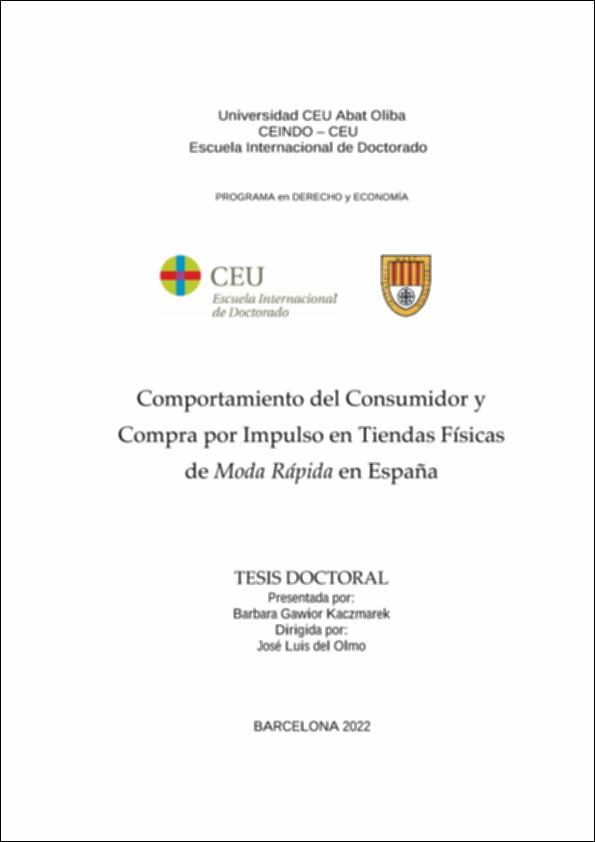Please use this identifier to cite or link to this item:
http://hdl.handle.net/10637/14655Comportamiento del consumidor y compra por impulso en tiendas físicas de moda rápida en España
| Title: | Comportamiento del consumidor y compra por impulso en tiendas físicas de moda rápida en España |
| Authors : | Gawior, Barbara |
| Keywords: | Conducta de los consumidores.; Moda.; Comercios.; Conducta dels consumidors.; Establiments comercials. |
| Abstract: | Numerosos estudios señalan que distintas motivaciones disparan las compras por impulso, especialmente de productos como ropa, calzado, libros, música, alimentación o tecnología. El propósito de esta investigación es analizar la influencia que tienen las motivaciones hedónicas, el interés por la moda y las discrepancias entre el Yo real y el Yo ideal como detonantes de la compra impulsiva de moda rápida en tiendas físicas. Es importante destacar que el contexto en el que se realizó la recolección de datos corresponde a los meses de mayo-julio de 2021 (una vez finalizadas muchas de las medidas sanitarias y distanciamiento social establecidas por el gobierno español), justo tras la reapertura de las tiendas físicas tras un periodo de confinamiento, limitaciones de uso de espacios públicos y distanciamiento social causados por el COVID-19. Un contexto, como muestra la investigación, que tuvo un importante impacto en el comportamiento del consumidor y sus motivaciones de compra. En esta investigación, se usó el método hipotético-deductivo con el fin de explicar y ampliar los conocimientos sobre el fenómeno de la compra impulsiva. La parte empírica de la investigación se basó en observaciones cuantitativas obtenidas a través de la escala de Compra Impulsiva, la escala de Motivaciones Hedónicas para conocer las motivaciones hedónicas de los compradores (gratificación, precio, compra social, compra de tendencias y aventura), la escala de interés por la moda del Consumer Style-Inventory, así como la escala de discrepancia entre el Yo real y el Yo ideal. Los resultados tras la aplicación de la modelización de ecuaciones estructurales para el modelo estructural planteado muestran que las motivaciones hedónicas de compra en búsqueda de gratificación, 6 motivaciones hedónicas de compra en búsqueda de aventura/experiencia y las motivaciones de compra en búsqueda de mejor precio u oferta actúan como detonantes de la compra por impulso de productos de Fast Fashion en tiendas físicas. Mientras que, en el resto de las variables, sobre todo las relacionadas con la interacción social no han sido estadísticamente significativos. Es indudable que la crisis sanitaria por COVID-19 proporcionó un contexto social, económico y sanitario imprevisible y desconocido hasta ahora. Aunque, durante la parte empírica, intentamos disociar la crisis sanitaria del contexto de compra "normal", nuestros resultados muestran claramente que la motivación de compra social, el interés por la moda (fashion consciousness), las motivaciones de compra en búsqueda de nuevas tendencias, o incluso la necesidad de automejora (búsqueda del yo ideal) no han sido estadísticamente significativos, como ya apuntamos en el apartado anterior. Las conclusiones de esta investigación contribuyen a la comprensión de los diferentes tipos de motivaciones de compra y su impacto en la compra por impulso dentro del sector de Moda Rápida. Numerous studies analyzed how different motivations trigger impulse buying behavior, especially for clothes, shoes, books, music, or tech products. More specifically, this research aims to analyze the influence of hedonic motivations, fashion awareness, and discrepancies between the real self and the ideal self as triggers for impulse buying of Fast Fashion products. This research was carried out between May and June 2021, just after the period of lockdown caused by the COVID-19 pandemic. During the pandemic, consumption patterns changed mainly due to the sanitary measures and imposed restrictions such as physical store closures, social distancing, limited opening hours, and stores' reduced capacity. Due to the unpredictable and unknown, so far situation, people's behavior evolved from panic buying of staple products to avoid any social interaction. Therefore, COVID-19 provided an unpredictable and unknown until now social and economic context for this research. Even if, during the empirical part, we tried to disassociate the sanitary crisis from the "normal" shopping context, our findings show clearly that social shopping motivation, fashion consciousness, idea shopping motivations, or even the need for selfenhancement lacked statistical significance. All above are related to social interactions. This investigation used the hypothetico-deductive approach to explain and expand knowledge about impulse buying behavior. The empirical part of the research was based on quantitative observations obtained through the Impulsive Buying scale, the Hedonic Motivations scale, the Consumer Style-Inventory Fashion Interest scale, and the Discrepancy scale between the real self and the ideal self. The results have shown that the hedonic motivations such as gratification shopping motivations (mood enhancement), adventure shopping motivations (entertainment as the primary motivation for shopping), and value-seeking shopping motivations are significantly related to the impulse buying of Fast Fashion products. While in the case of the rest of the variables, the results have not shown a statistically significant relation, due to the sudden social and economic changes. The findings of this research contribute to understanding the different types of shopping motivations and their impact on impulse buying within the Fast Fashion industry. |
| Description: | Tesis CEINDO, Universitat Abat Oliba CEU, Programa de doctorado "Derecho y Economía". Leída el 23 de septiembre de 2023 |
| Director(s): | Olmo Arriaga, José Luis del |
| Defense date: | 23-09-2023 |
| URI: | http://hdl.handle.net/10637/14655 |
| Rights : | http://creativecommons.org/licenses/by-nc-nd/4.0/deed.es |
| Issue Date: | 26-Oct-2023 |
| Center : | Universitat Abat Oliba CEU |
| Appears in Collections: | Derecho y Economía |
Items in DSpace are protected by copyright, with all rights reserved, unless otherwise indicated.


